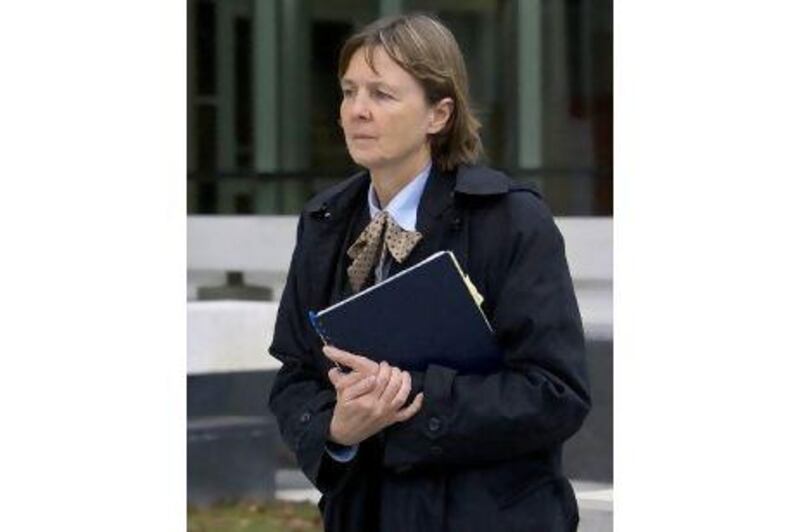Judy Clarke will once again be the public face of the despised.
She has defended the 1996 Olympic Summer Games bomber Eric Rudolph, Susan Smith, who drowned her children in a South Carolina lake, and Zacharias Moussaoui, convicted for his role in the September 11 attacks as the so-called 20th hijacker.
Now Ms Clarke will battle to keep Jared Lee Loughner from receiving the death penalty if found guilty in the killings of six people, including a federal judge, and the attempted assassination of a US congresswoman in Tucson, Arizona, last week.
So far, the federal government has charged Mr Loughner in the murders of two federal employees, and the local prosecutor has said she will "pursue charges on behalf of the non-federal victims".
On media outlets across the United States and elsewhere the mantra is that Mr Loughner is obviously guilty and should be executed soon. Yet he will have the benefit of a top-notch, experienced lawyer, which has become a custom in the American judicial system for high-profile trials.
Ms Clarke, who is in private practice in California, is known as an expert on death-penalty cases, especially those in which mental illness is an issue. One lawyer was quoted by the Associated Press as saying there is "probably nobody in the country more knowledgeable or experienced in defending such cases as Judy".
"The reason that he needs a lawyer is that he is presumed innocent and his rights need to be protected, which is the job of a defence attorney. This is especially true in a death-penalty case where the stakes are so high," said Edward B MacMahon Jr, who was also one of Moussaoui's lawyers. "The death penalty is so randomly applied that specially trained attorneys are needed to see that fairness and cool heads can get involved."
Mr MacMahon said many defence lawyers involved in horrific criminal cases "believe that the death penalty is unconstitutional since it is so unfairly applied and they take these cases to see that the state does not take a life unfairly".
He said Ms Clarke, who is for abolishing the death penalty, is the embodiment of such a lawyer.
"It is very rare that a defendant charged with the death penalty is innocent of the charges and it takes trained lawyers to focus on the penalty and not just the crime itself," Mr MacMahon said.
John White, who teaches constitutional law at Catholic University in Washington, added that "the provisions of our constitution give defendants the
right to a speedy and fair trial and a presumption of innocence.
"In high-profile cases, this is difficult to achieve, since the media give so much attention to a case that it is hard to find a jury that (a) either hasn't heard about it or (b) is without prejudice."
He said "there will be two trials in this case. One will be for the federal officials who were shot and killed. The other trials will be for the citizens of Arizona who were not federal officials who were killed.
"This is a similarity to the Oklahoma City" bombing case in 1995.
With Barack Obama, the president of the United States, having gone to Tucson to help the community heal and the recovery of Gabrielle Giffords, the US representative, who was shot in the head, a daily news item, the glare of publicity will not dissipate soon.
But Mr MacMahon said for a trial lawyer in a case such as this, the media are irrelevant and lawyers often make the mistake of trying their cases in the press.
"I try not to ever worry about the media in a case since it is the 12 jurors who decide cases," Mr MacMahon said. "In my view, lawyers who worry about the media get distracted from their real jobs."
Ms Clarke will no doubt petition the court to have the case tried elsewhere, arguing that an impartial jury cannot be found in the Tucson area. She has already asked that the prosecution team be replaced because of its relationship with the judge who was killed.
She has not indicated whether she will mount an insanity defence, but mental-health issues and Mr Loughner's life history are sure to be part of her strategy.
Mr MacMahon said it would be hard for Ms Clarke to show that Mr Loughner did not know right from wrong when he allegedly pulled the trigger that killed six people and wounded more than a dozen others.
He said the only real goal for Ms Clarke is "to avoid the death penalty".
"You really have a life on your hands," Mr MacMahon said. "Death is different. There are no higher stakes."
He said a defence lawyer cannot try to paint his client as something he is not - an al Qa'eda member cannot be billed as a boy scout - and that "you have to keep your credibility with the jury". This means that Ms Clarke will likely focus on Mr Loughner's background and reportedly odd behaviour over the past few years in trying to have his life spared.
Acknowledging that Mr Loughner likely "will never get out of prison", Mr MacMahon said that in the United States, "no matter who the defendant is the government has to prove his guilt beyond a reasonable doubt.
"That is our system of justice."






